Charles E W Bean, Diaries, AWM38 3DRL 606/260/1 - 1916 - 1930 - Part 15
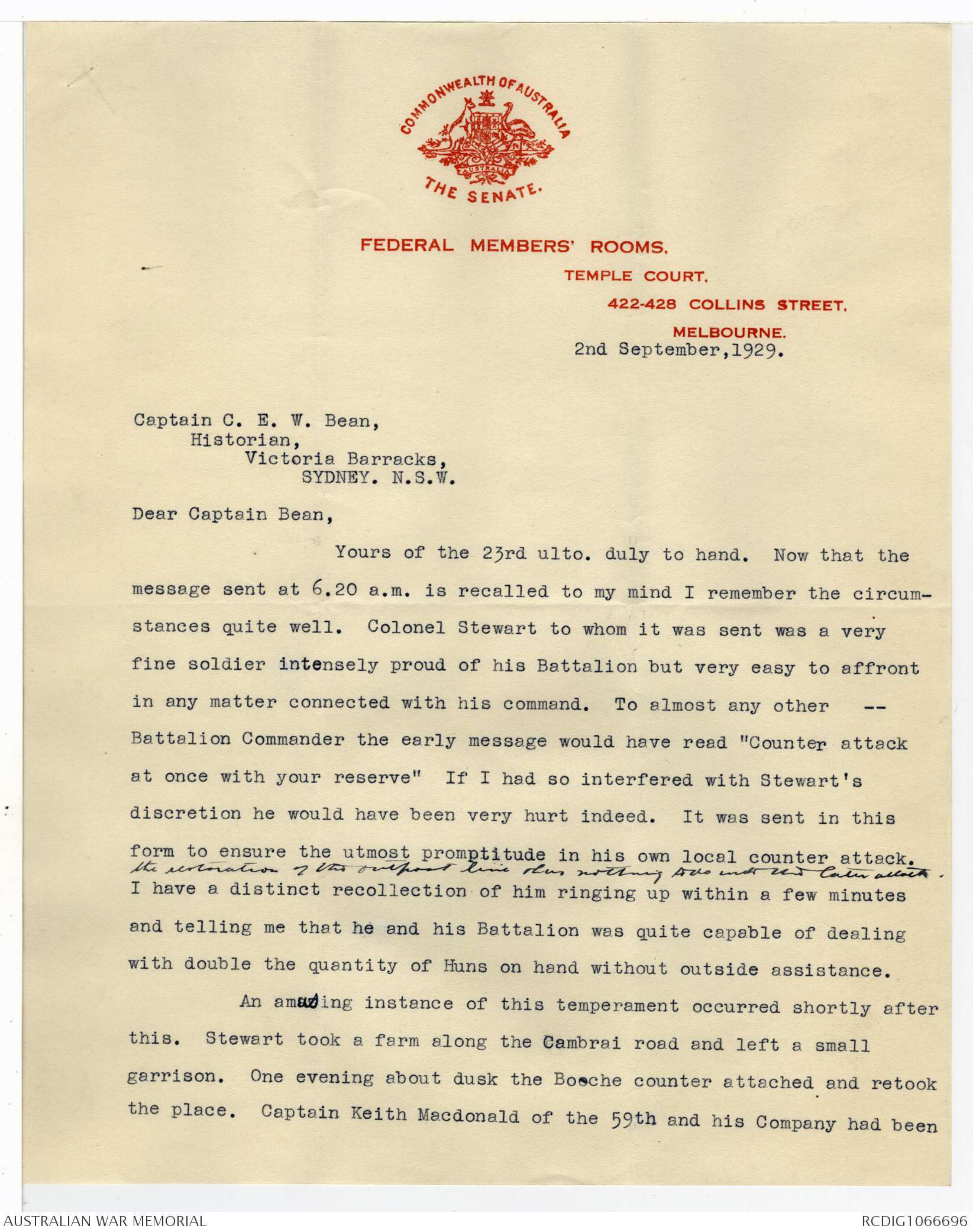
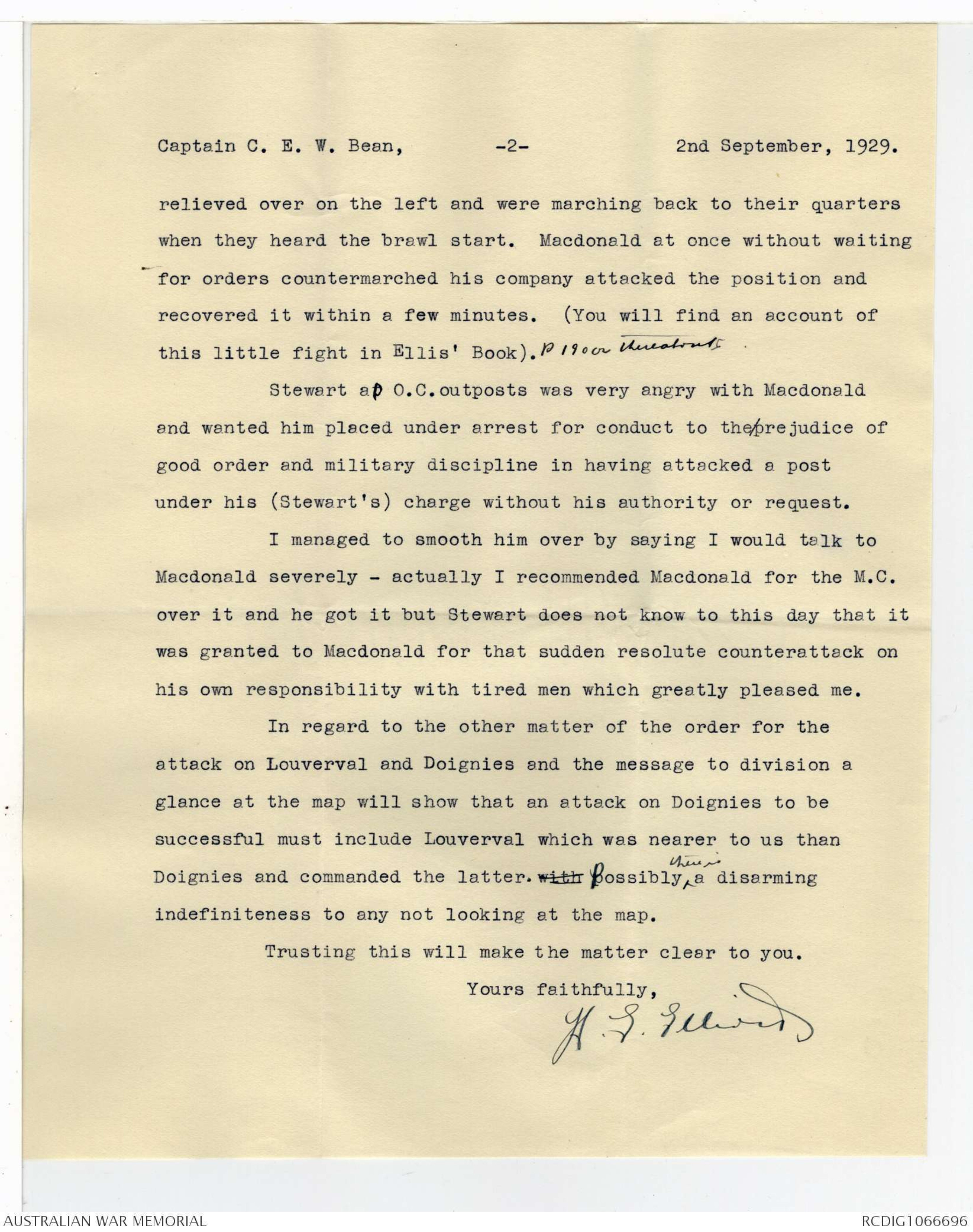
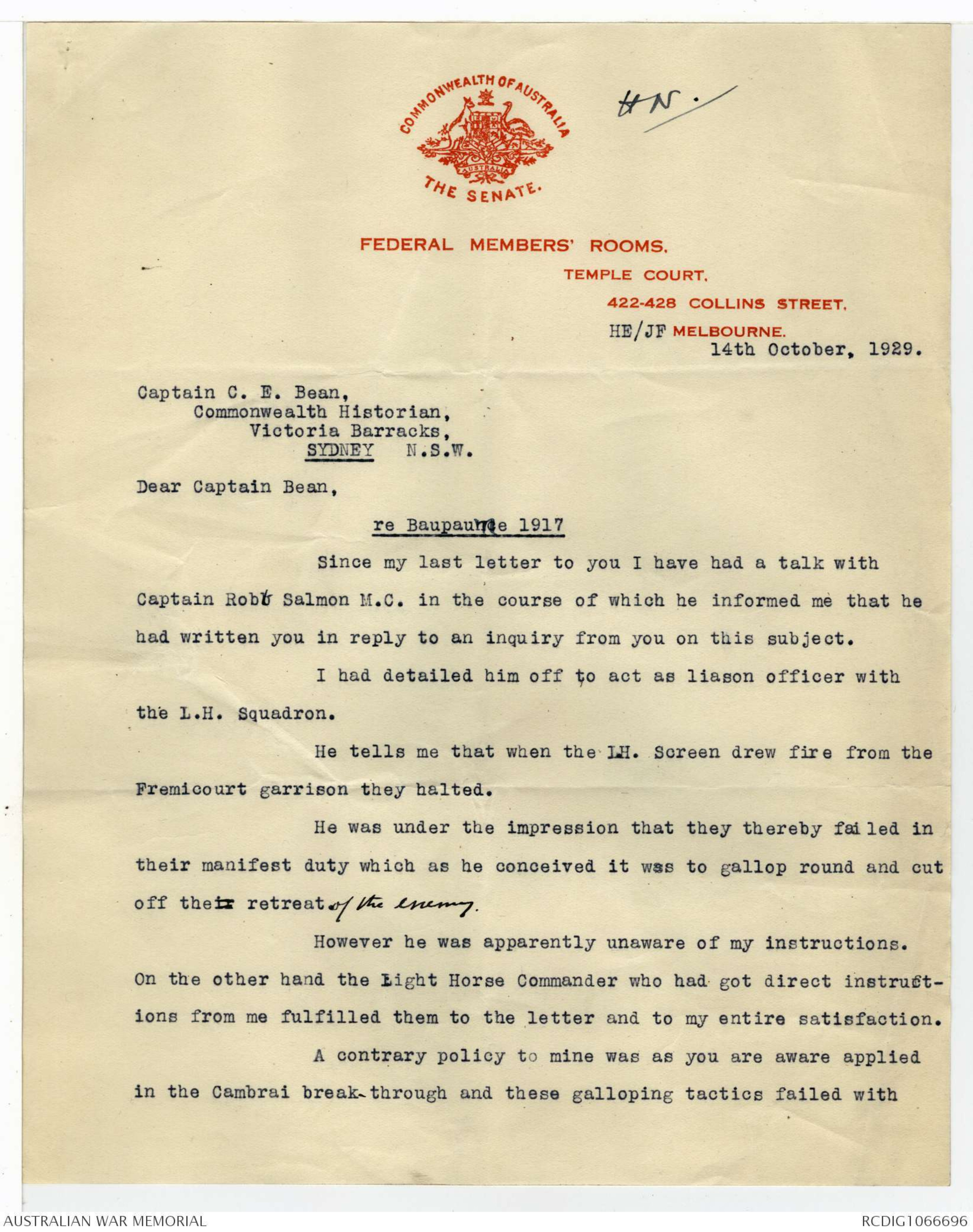
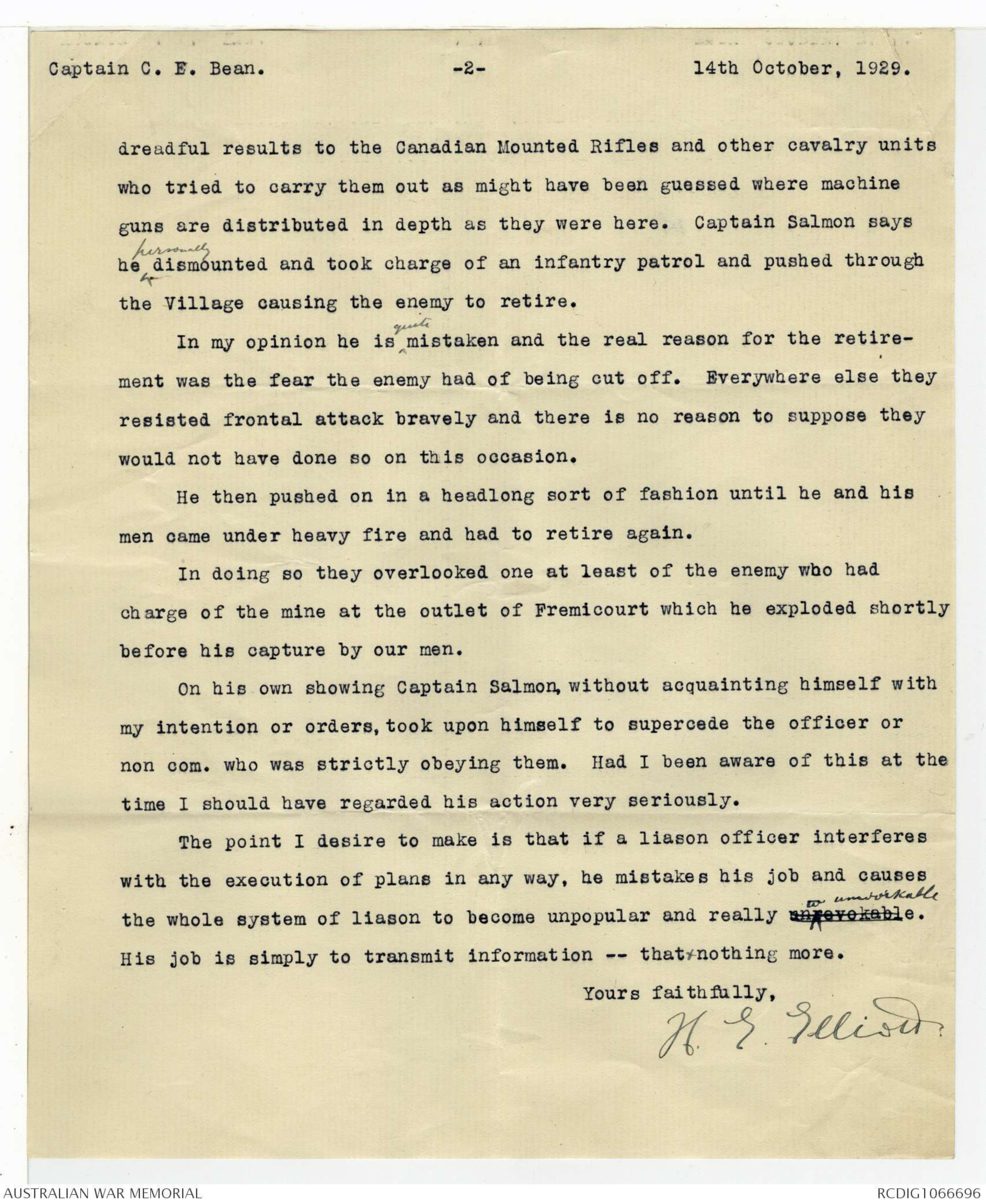
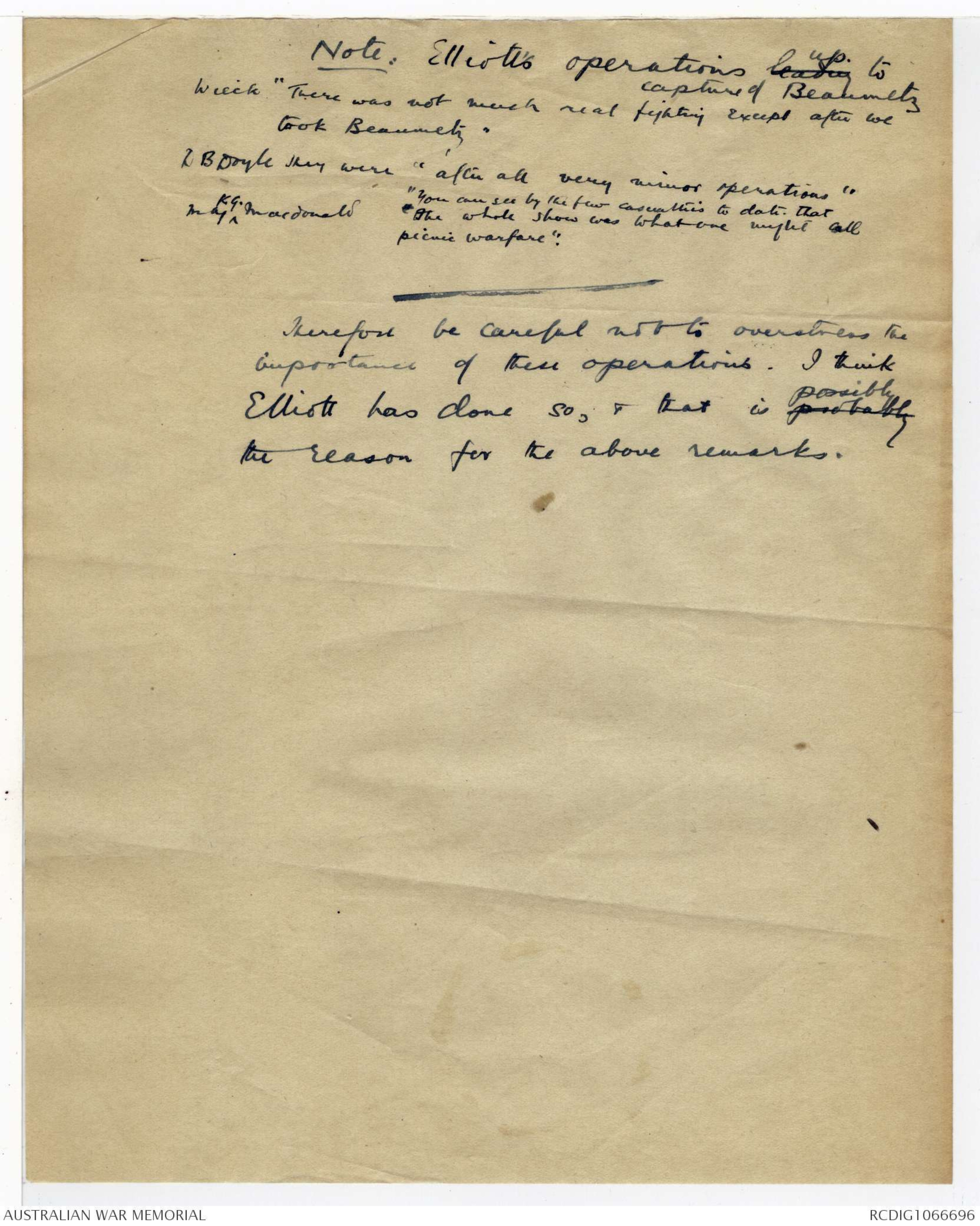
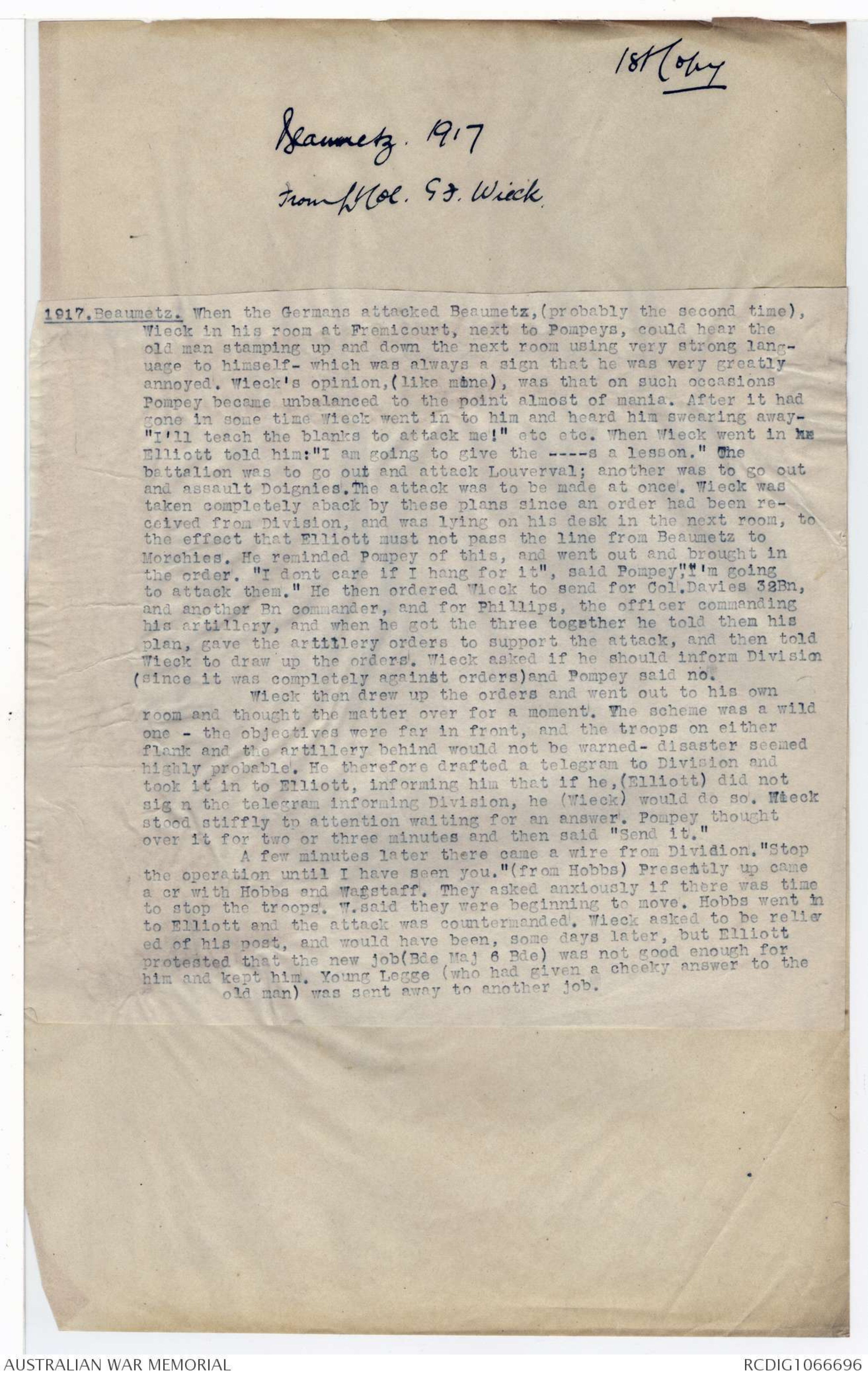
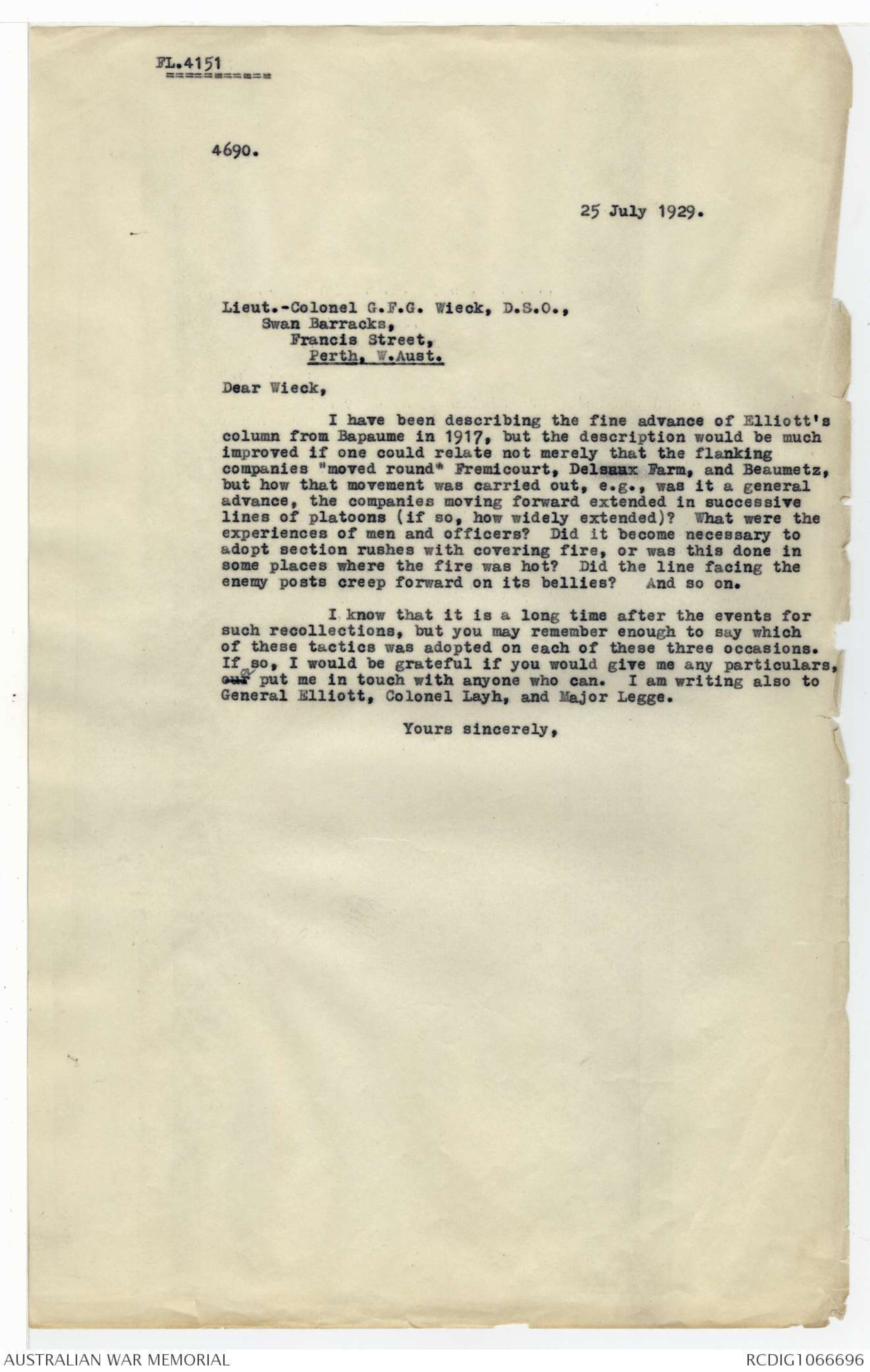
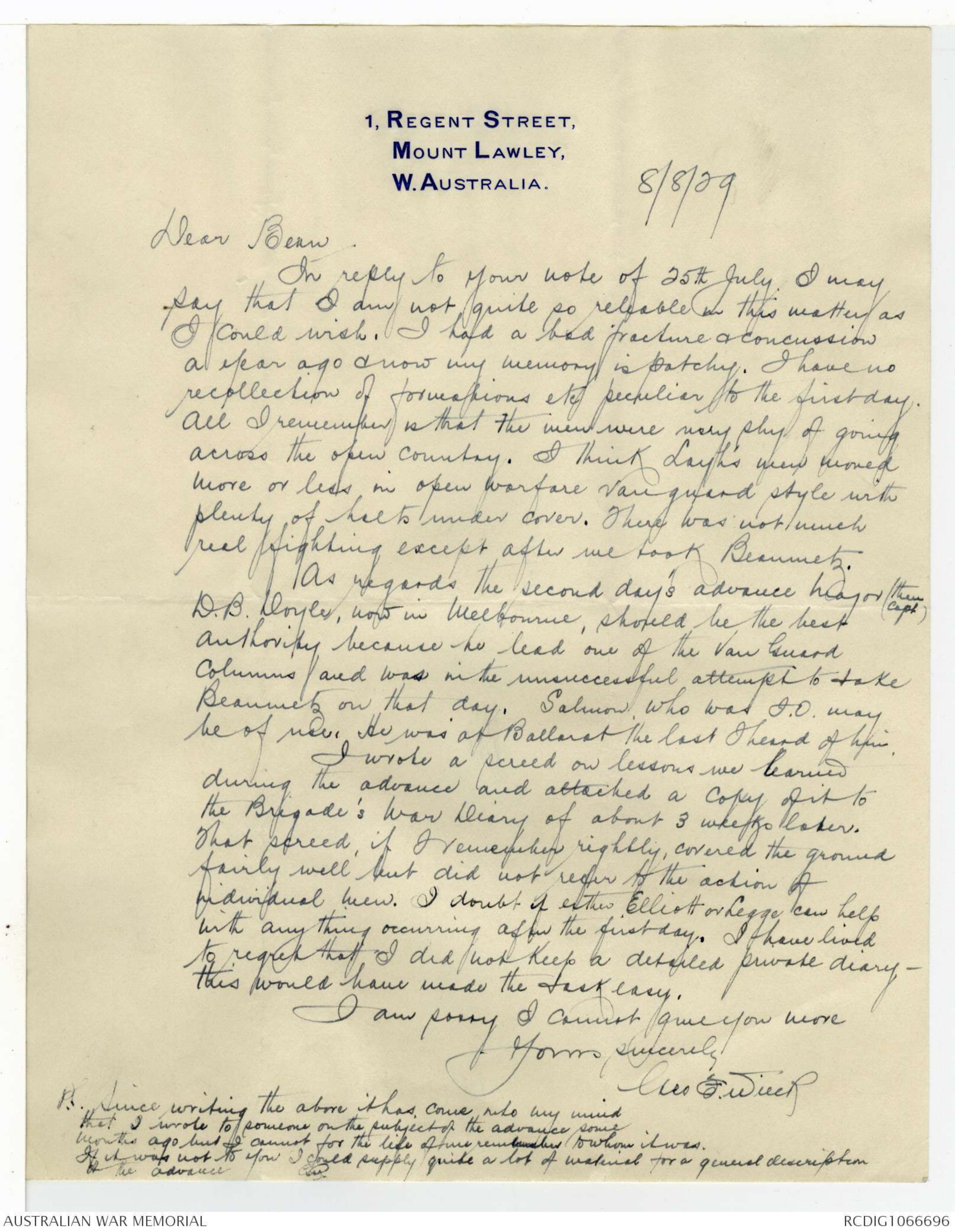
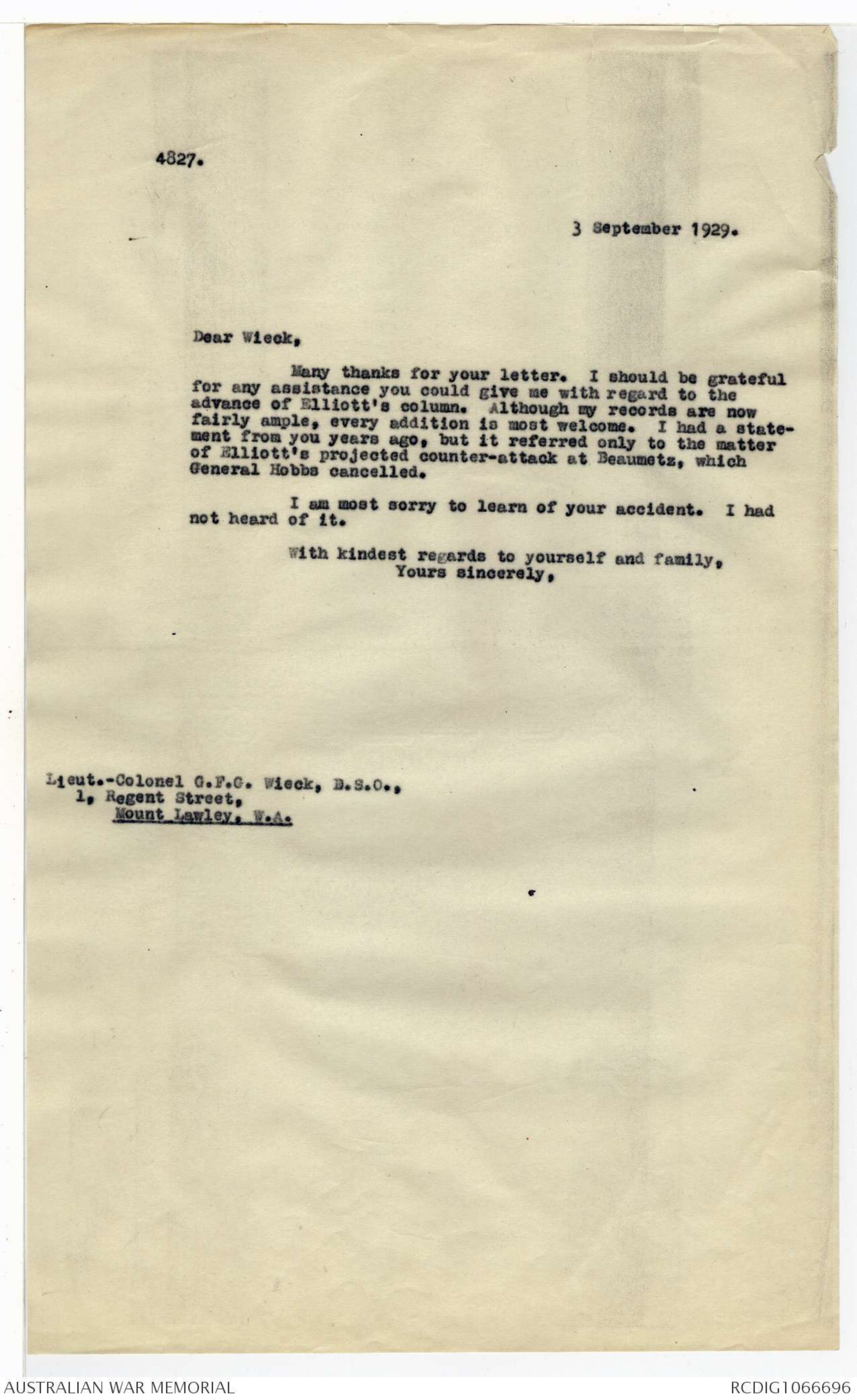
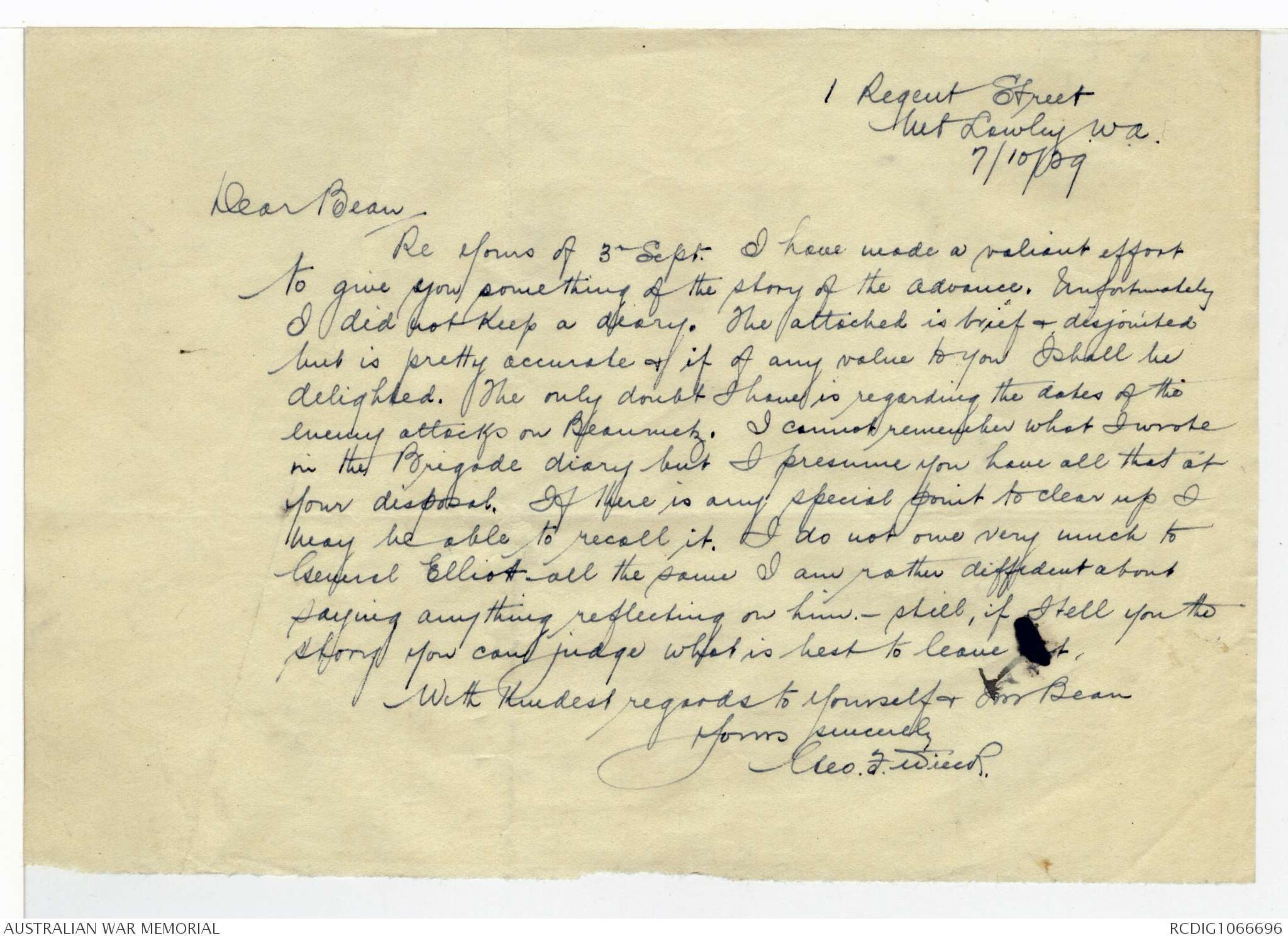
COMMONWEALTH OF AUSTRALIA
THE SENATE
FEDERAL MEMBERS' ROOMS.
TEMPLE COURT.
422-428 COLLINS STREET.
MELBOURNE.
2nd September, 1929.
Captain C. E. W. Bean,
Historian,
Victoria Barracks.
SYDNEY. N.S.W.
Dear Captain Bean,
Yours of the 23rd ulto. duly to hand. Now that the
message sent at 6.20 a.m. is recalled to my mind I remember the
circumstances quite well. Colonel Stewart to whom it was sent was a very
fine soldier intensely proud of his Battalion but very easy to affront
in any matter connected with his command. To almost any other --
Battalion Commander the early message would have read "Counter attack
at once with your reserve" If I had so interfered with Stewart’s
discretion he would have been very hurt indeed. It was sent in this
form to ensure the utmost promptitude in his own local counter attack.
The restoration of this outpost line has nothing to do with the counter attack.
I have a distinct recollection of him ringing up within a few minutes
and telling me that he and his Battalion was quite capable of dealing
with double the quantity of Huns on hand without outside assistance.
An amusing instance of this temperament occurred shortly after
this. Stewart took a farm along the Cambrai road and left a small
garrison. One evening about dusk the Bosche counter attached and retook
the place. Captain Keith Macdonald of the 59th and his Company had been
Captain C. E. W. Bean, -2- 2nd September, 1929.
relieved over on the left and were marching back to their quarters
when they heard the brawl start. Macdonald at once without waiting
for orders countermarched his company attacked the position and
recovered it within a few minutes. (You will find an account of
this Little fight in Eilis’ Book), P 190 or thereabouts.
Stewart at O.C. outposts was very angry with Macdonald
and wanted him placed under arrest for conduct to the/prejudice of
good order and military discipline in having attacked a post
under his (Stewart’s) charge without his authority or request.
I managed to smooth him over by saying I would talk to
Macdonald severely - actually I recommended Macdonald for the M.C.
over it and he got it but Stewart does not know to this day that it
was granted to Macdonald for that sudden resolute counterattack on
his own responsibility with tired men which greatly pleased me.
In regard to the other matter of the order for the
attack on Louverval and Doignies and the message to division a
glance at the map will show that an attack on Doignies to be
successful must include Louverval which was nearer to us than
Doignies and commanded the latter. with Possibly ^there is a disarming
indefiniteness to any not looking at the map.
Trusting this will make the matter clear to you.
Yours faithfully,
H.E. Elliott
H.N.
COMMONWEALTH OF AUSTRALIA
THE SENATE
FEDERAL MEMBERS' ROOMS.
TEMPLE COURT.
422-428 COLLINS STREET.
HE/JF MELBOURNE.
14th October, 1929.
Captain C. E. Bean
Commonwealth Historian,
Victoria Barracks
SYDNEY N.S.W.
Dear Captain Bean,
re Baupaume 1917
Since my last letter to you I have had a talk with
Captain Robt Salmon M.C. in the course of which he informed me that he
had written you in reply to an inquiry from you on this subject.
I had detailed him off to act as liason officer with
the L.H. Squadron.
He tells me that when the LH. Screen drew fire from the
Fremicourt garrison they halted.
He was under the impression that they thereby failed in
their manifest duty which as he conceived it was to gallop round and cut
off their retreat of the enemy.
However he was apparently unaware of my instructions.
On the other hand the Light Horse Commander who had got direct instructions
from me fulfilled them to the letter and to my entire satisfaction.
A contrary policy to mine was as you are aware applied
in the Cambrai break-through and these galloping tactics failed with
Captain C.E. Bean -2- 14th October, 1929
dreadful results to the Canadian Mounted Rifles and other cavalry units
who tried to carry them out as might have been guessed where machine
guns are distributed in depth as they were here. Captain Salmon says
he ^personally dismounted and took charge of an infantry patrol and pushed through
the Village causing the enemy to retire.
In my opinion he is ^quite mistaken and the real reason for the retirement
was the fear the enemy had of being cut off. Everywhere else they
resisted frontal attack bravely and there is no reason to suppose they
would not have done so on this occasion.
He then pushed on in a headlong sort of fashion until he and his
men came under heavy fire and had to retire again.
In doing so they overlooked one at least of the enemy who had
charge of the mine at the outlet of Fremicourt which he exploded shortly
before his capture by our men.
On his own showing Captain Salmon, without acquainting himself with
my intention or orders, took upon himself to supercede the officer or
non com. who was strictly obeying them. Had I been aware of this at the
time I should have regarded his action very seriously.
The point I desire to make is that if a liason officer interferes
with the execution of plans in any way, he mistakes his job and causes
the whole system of liason to become unpopular and really angexekable. unworkable.
His job is simply to transmit information -- that & nothing more.
Yours faithfully,
H.E. Elliott
Note. Elliott's operations leading up to
capture Beaumetz
Wieck. "There was not much real fighting except after we
took Beaumetz."
L B. Doyle They were " after all very minor operations"
Maj ^KG. Macdonald "You can see by the few casualties to date. that
the whole show was what one might call
picnic warfare".
Therefore be careful not to overstress the
importance of these operations. I think
Elliott has done so; & that is probably possibly
the reason for the above remarks.
1st Copy
Beaumetz. 1917
From Lt. Col. GF. Wieck
1917. Beaumetz. When the Germans attacked Beaumetz, (probably the second time),
Wieck in his room at Fremicourt, next to Pompeys, could hear the
old man stamping up and down the next room using very strong
language to himself- which was always a sign that he was very greatly
annoyed. Wieck's opinion, (like mine), was that on such occasions
Pompey became unbalanced to the point almost of mania. After it had
gone in some time Wieck went in to him and heard him swearing away-
"I'll teach the blanks to attack me!" etc etc. Then Wieck went in he
Elliott told him: "I am going to give the -------s a lesson." The
battalion was to go out and attack Louverval; another was to go out
and assault Doignies.. The attack was to be made at once. Wieck was
taken completely aback by these plans since an order had been
received from Division, and was lying on his desk in the next room, to
the effect that Elliott must not pass the line from Beaumetz to
Morchies. He reminded Pompey of this, and went out and brought in
the order. I dont care if I hang for it," said Pompey) I'm going
to attack them." He then ordered Wieck to send for Col.Davies 32Bn,
and another Bn commander, and for Phillips, the officer commanding
his artillery, and when he got the three together he told them his
plan, gave the artillery orders to support the attack, and then told
Wieck to draw up the orders. Wieck asked if he should inform Division
(since it was completely against orders) and Pompey said no.
Wieck then drew up the orders and went out to his own
room and thought the matter over for a moment. The scheme was a wild
one - the objectives were far in front, and the troops on either
flank and the artillery behind would not be warned- disaster seemed
highly probable. He therefore drafted a telegram to Division and
took it in to Elliott, informing him that if he, (Elliott) did not
sign the telegram informing Division, he (Wieck) would do so. Wieck
stood stiffly to attention waiting for an answer, Pompey thought
over it for two or three minutes and then said "Send it."
A few minutes later there came a wire from Dividion. "Stop
the operation until I have seen you." (from Hobbs) Presently up came
a cr with Hobbs and Wagstaff. They asked anxiously if there was time
to stop the troops. W. said they were beginning to move. Hobbs went in
to Elliott and the attack was countermanded. Wieck asked to be relieved
of his post, and would have been, some days later, but Elliott
protested that the new job (Bde Maj 6 Bde) was not good enough for
him, and kept him, Young Legge (who had given a cheeky answer to the
old man) was sent away to another job.
FL.4151
4690.
25 July 1929.
Lieut.-Colonel G.F.G. Wieck, D.S.O.,
Swan Barracks
Francis Street,
Perth. W.Aust.
Dear Wieck,
I have been describing the fine advance of Elliott's
column from Bapaume in 1917, but the description would be much
improved if one could relate not merely that the flanking
companies "moved round" Fremicourt, Delsaux Farm, and Beaumetz,
but how that movement was carried out, e.g., was it a general
advance, the companies moving forward extended in successive
lines of platoons (if so, how widely extended)? What were the
experiences of men and officers? Did it become necessary to
adopt section rushes with covering fire, or was this done in
some places where the fire was hot? Did the line facing the
enemy posts creep forward on its bellies? And so on.
I know that it is a long time after the events for
such recollections, but you may remember enough to say which
of these tactics was adopted on each of these three occasions.
If so, I would be grateful if you would give me any particulars,our or put me in touch with anyone who can. I am writing also to
General Elliott, Colonel Layh, and Major Legge.
Yours sincerely,
1, REGENT STREET.
MOUNT LAWLEY.
W.AUSTRALIA.
8/8/29
Dear Bean
I reply to your note of 25th July. I may
say that I am not quite so reliable in this matter as
I could wish. I had a bad fracture & concussion
a year ago & now my memory is patchy. I have no
recollection of formations etc peculiar to the first day.
All I remember is that the men were very shy of going
across the open country. I think Layh's men moved
more or less in open warfare vanguard style with
plenty of halts under cover. There was not much
real frighting except after we took Beaumetz.
As regards the second day's advance Major (then Capt)
D.B. Doyle, now in Melbourne, should be the best
authority because he lead one of the Van Guard
Columns and was in the unsuccessful attempt to take
Beaumetz on that day. Salmon, who was I.O may
be of use. He was at Ballarat the last I heard of him.
I wrote a screed on lessons we learned
during the advance and attached a copy of it to
the Brigade's War Diary of about 3 weeks later.
That screed, if I remember rightly, covered the ground
fairly well but did not refer to the action of
individual men. I doubt if either Elliott or Legge can help
with anything occurring after the first day. I have lived
to regret that I did not keep a detailed private diary -
this would have made the task easy.
I am sorry I cannot give you more
Yours Sincerely
Geo F Wieck
P.S Since writing the above it has come into my mind
that I wrote to someone on the subject of the advance some
months ago but I cannot for the life of me remember to whom it was.
If it was not to you I could supply quite a lot of material for a general description
of the advance
4827.
3 September 1929.
Dear Wieck,
Many thanks for your letter. I should be grateful
for any assistance you could give me with regard to the
advance of Elliott's column. Although my records are now
fairly ample, every addition is most welcome. I had a
statement from you years ago, but it referred only to the matter
of Elliott's projected counter-attack at Beaumetz, which
General Hobbs cancelled.
I am most sorry to learn of your accident. I had
not heard of 1t.
With kindest regards to yourself and family,
Yours sincerely,
Lieut.-Colonel G.F.G. Wieck, D.S.O.,
1, Regent Street,
Mount Lawley W.A
1 Regent Street
Mt Lawley W.A.
7/10/29
Dear Bean
Re yours of 3n Sept. I have made a valiant effort
to give you something of the story of the advance. Unfortunately
I did not keep a diary. The attached is brief & disjointed
but is pretty accurate & if of any value to you I shall be
delighted. The only doubt I have is regarding the dates of the
enemy attacks on Beaumetz. I cannot remember what I wrote
in the Brigade diary but I presume you have all that at
your disposal. If there is any special point to clear up I
may be able to recall it. I do not owe very much to
General Elliot all the same I am rather diffident about
saying anything reflecting on him - still, if I tell you the
story you can judge what is best to leave out,
With kindest regards to yourself & Mrs Bean
Yours sincerely
Geo. F. Wieck
 Maralyn K
Maralyn KThis transcription item is now locked to you for editing. To release the lock either Save your changes or Cancel.
This lock will be automatically released after 60 minutes of inactivity.